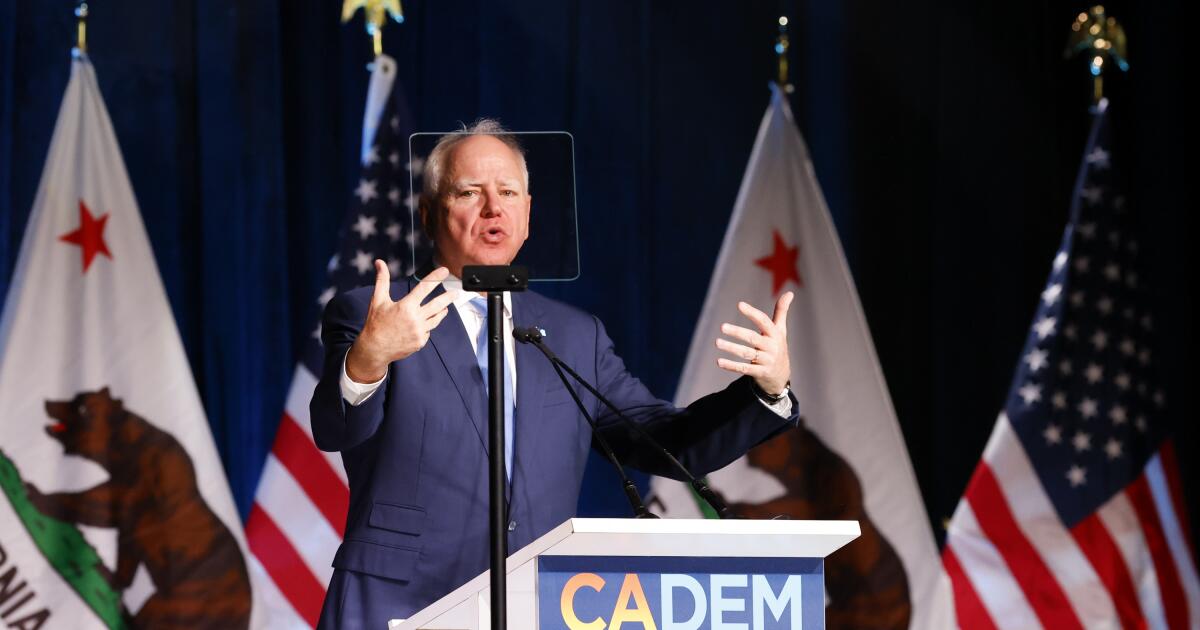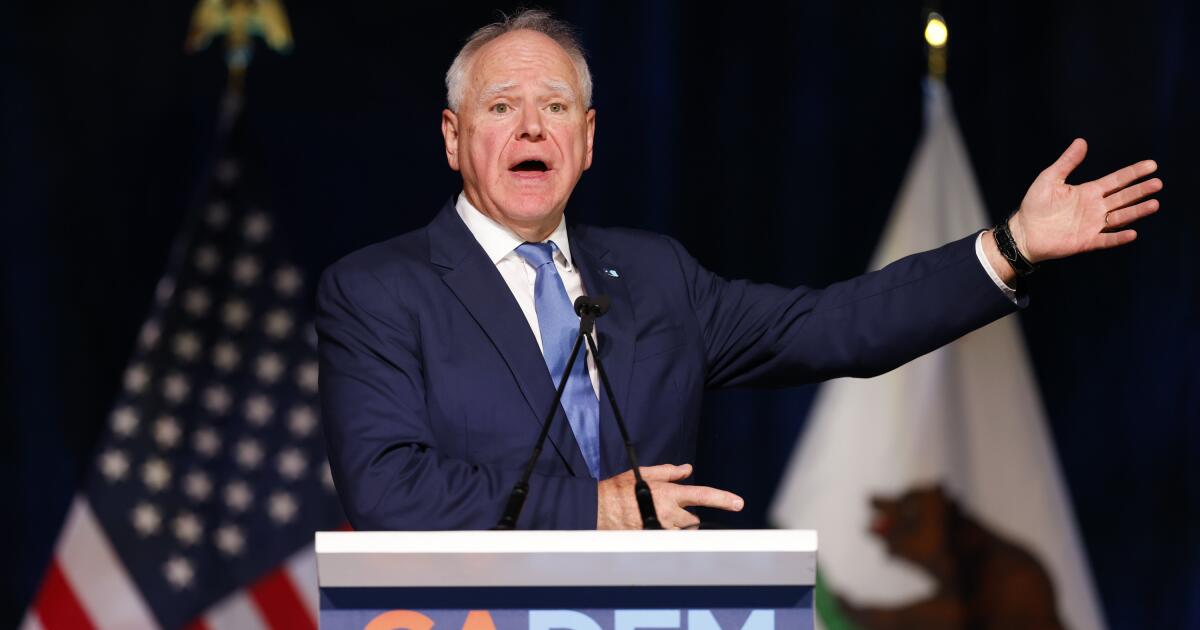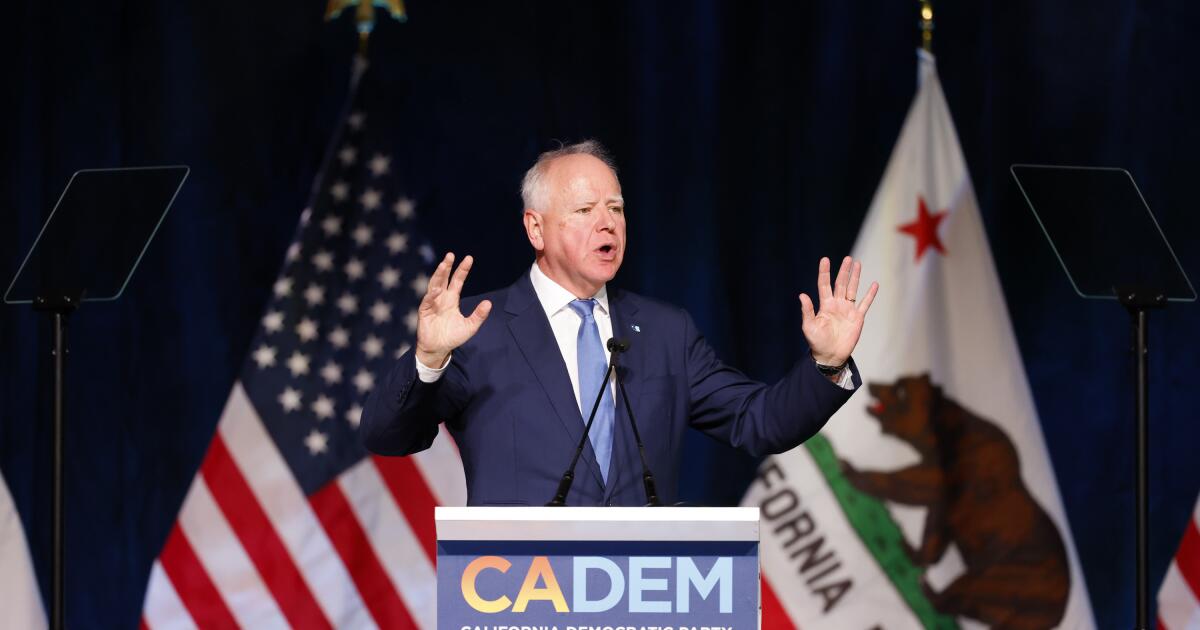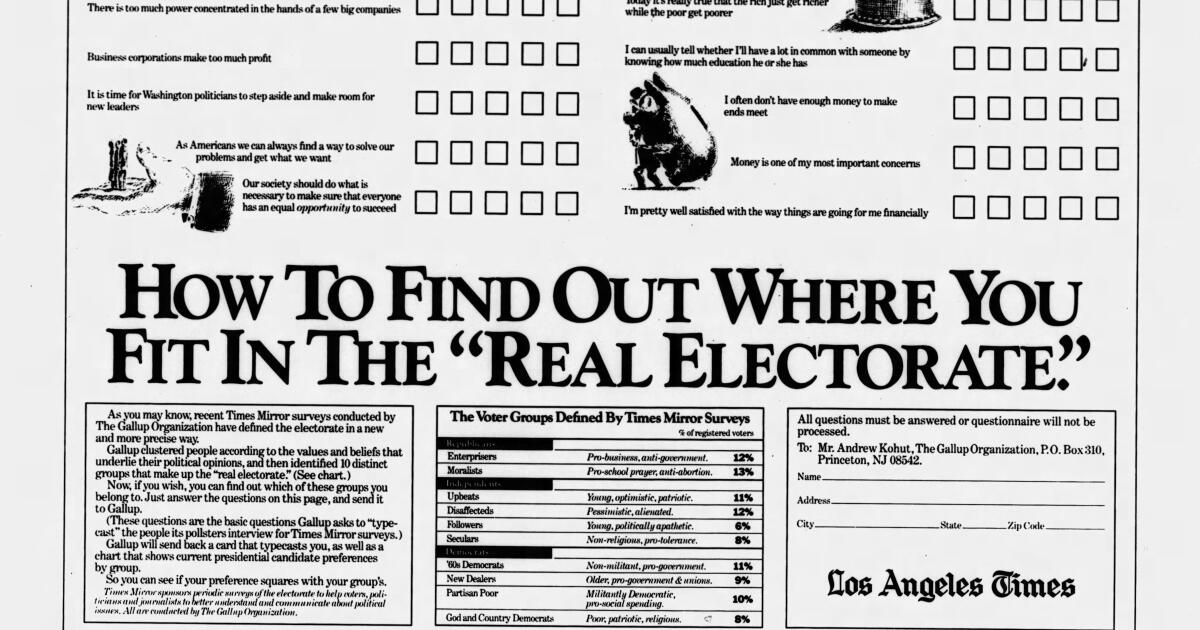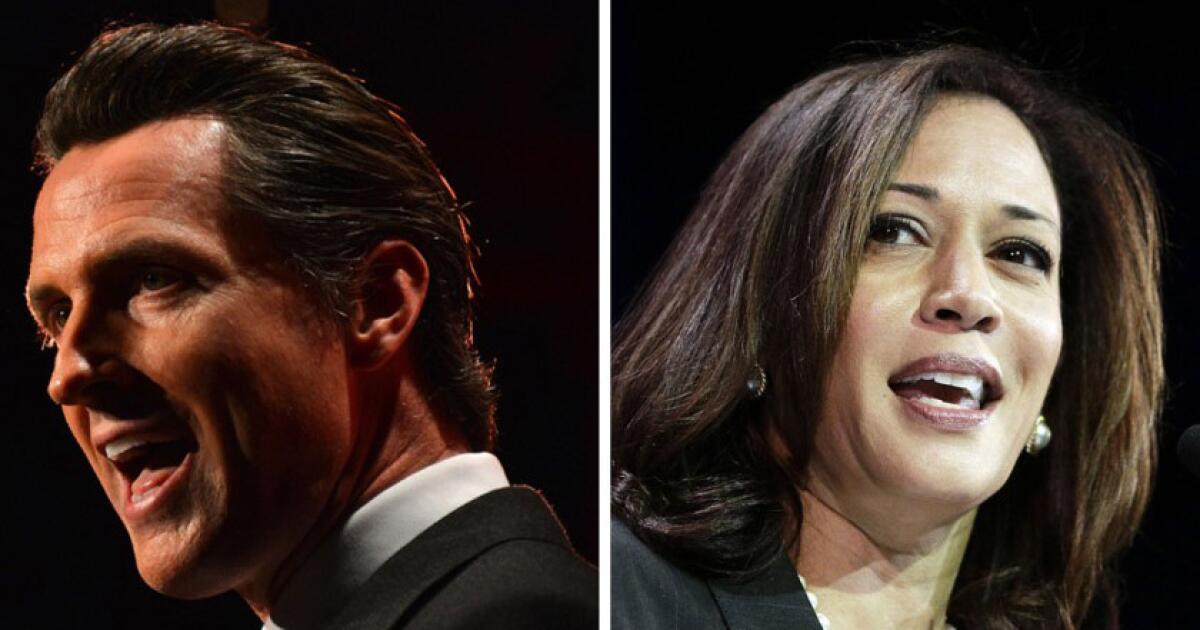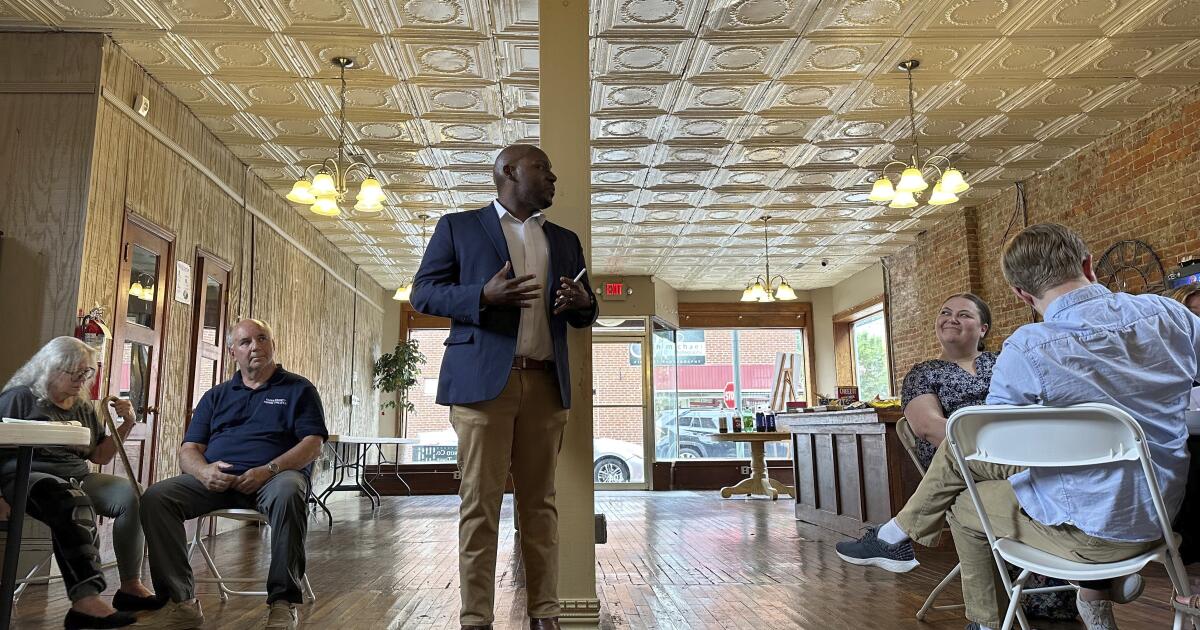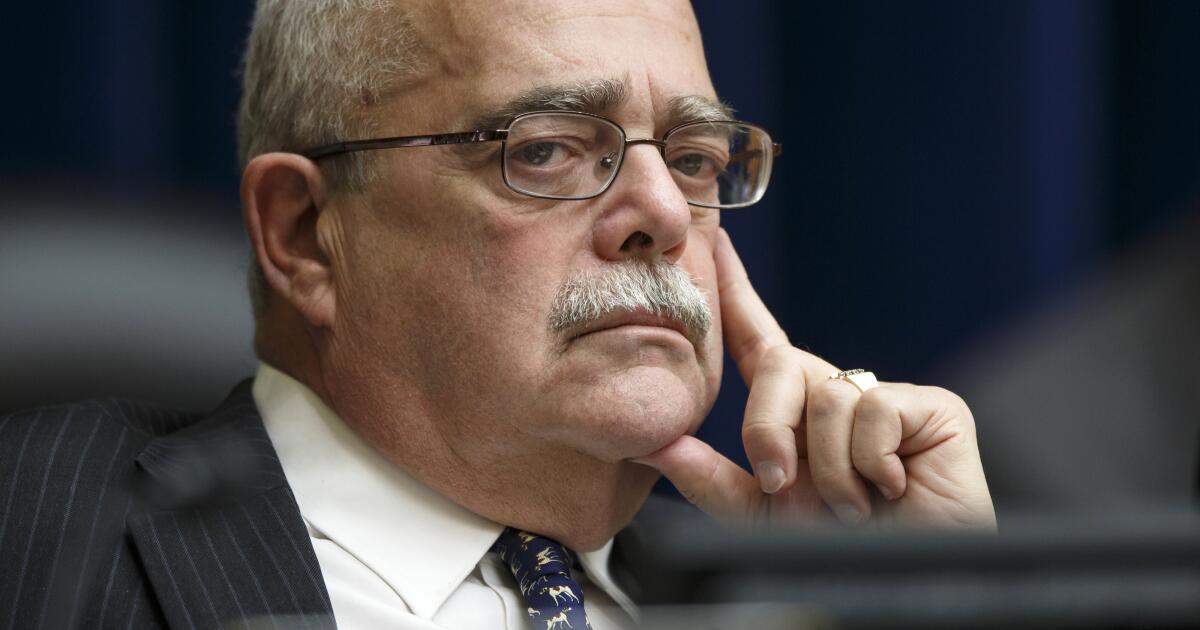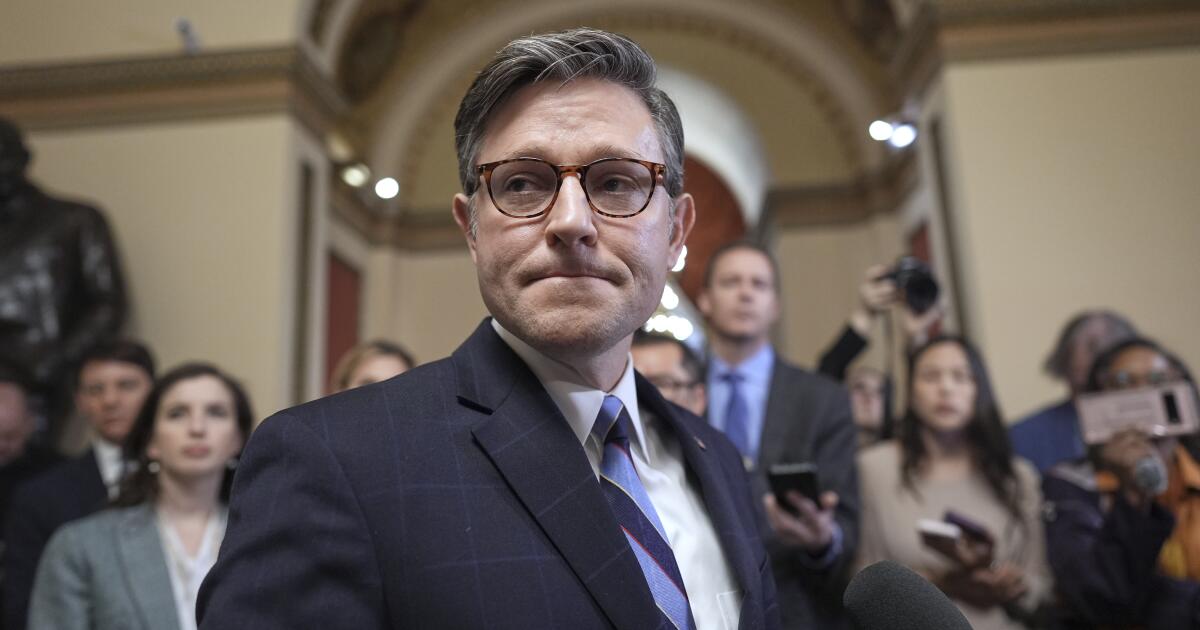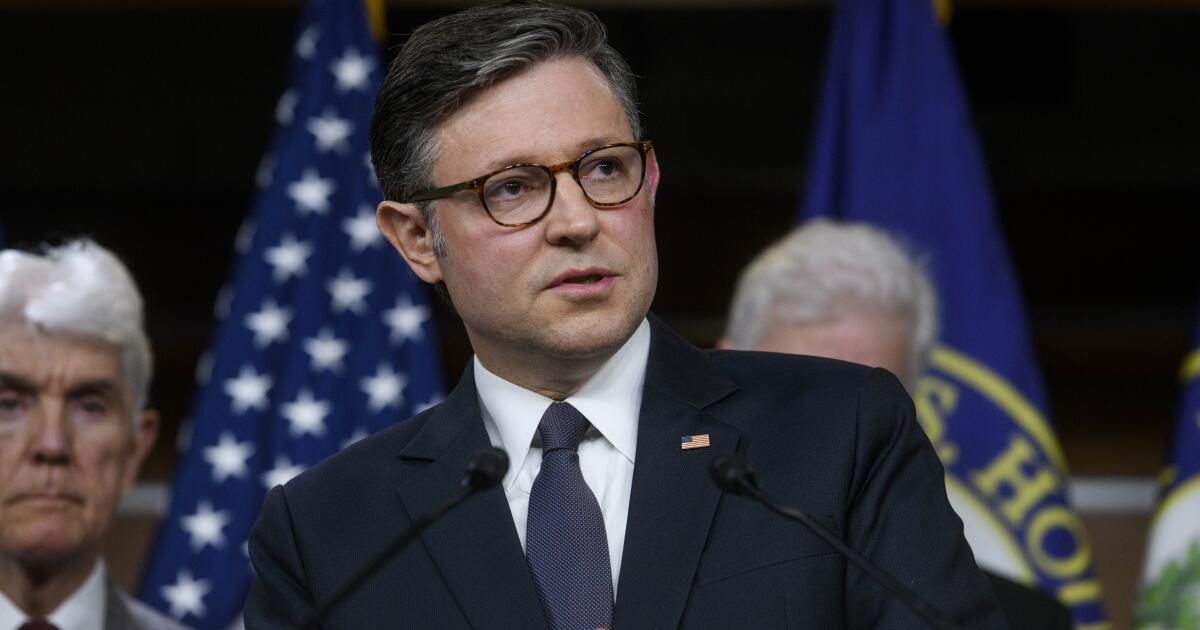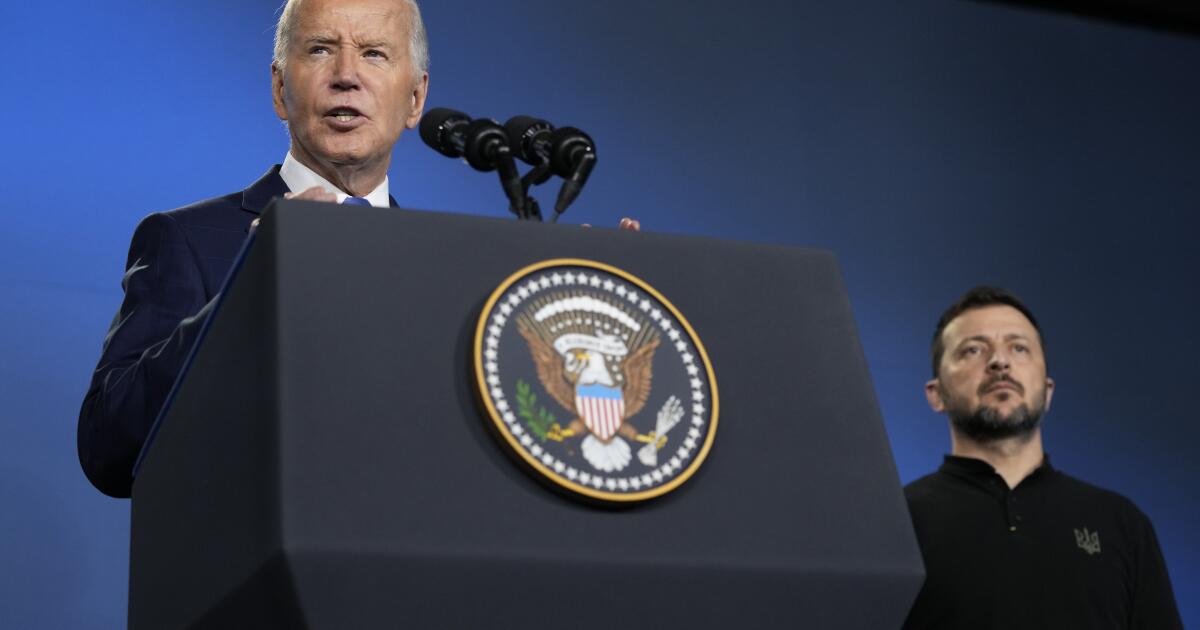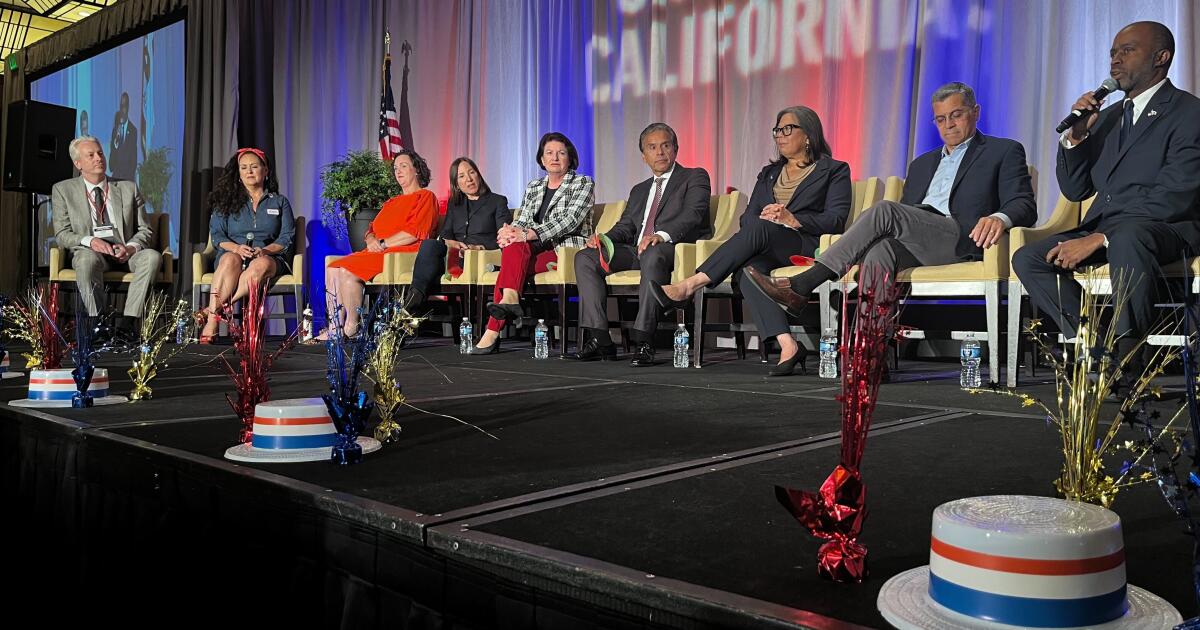Democrats are busy bashing themselves. Needed, or just needy?
To hear Republicans tell it, California is a failed state and Donald Trump won the presidency in a landslide that gives him a mandate to do as he pleases. No surprise there.
But more and more, Democrats are echoing those talking points. Ever since Kamala Harris lost the election, the Democratic Party has been on a nationwide self-flagellation tour. One after another, its leaders have stuck their heads deep into their navels, hoping to find out why so many Americans — especially young people, Black voters and Latinos — shunned the former vice president.
Even in California, a reliably blue state, the soul-searching has been extreme, as seen at last weekend’s state Democratic Party convention, where a parade of speakers — including Harris’ 2024 running mate, Tim Walz — wailed and moaned and did the woe-is-us-thing.
Is it long-overdue introspection, or just annoying self-pity? Our columnists Anita Chabria and Mark Z. Barabak hash it out.
Chabria: Mark, you were at the convention in Anaheim. Thoughts?
Barabak: I’ll start by noting this is the first convention I’ve attended — and I’ve been to dozens — rated “R” for adult language. Apparently, Democrats think by dropping a lot of f-bombs they can demonstrate to voters their authenticity and passion. But it seemed kind of stagy and, after a while, grew tiresome.
I’ve covered Nancy Pelosi for more than three decades and never once heard her utter a curse word, in public or private. I don’t recall Martin Luther King Jr., saying, “I have a [expletive deleted] dream.” Both were pretty darned effective leaders.
Democrats have a lot of work to do. But cursing a blue streak isn’t going to win them back the White House or control of Congress.
Chabria: As someone known to routinely curse in polite society, I’m not one to judge an expletive. But that cussing and fussing brings up a larger point: Democrats are desperate to prove how serious and passionate they are about fixing themselves. Gov. Gavin Newsom has called the Democratic brand “toxic.” Walz told his fellow Dems: “We’re in this mess because some of it’s our own doing.”
It seems like across the country, the one thing Democrats can agree on is that they are lame. Or at least, they see themselves as lame. I’m not sure the average person finds Democratic ideals such as equality or due process quite so off-putting, especially as Trump and his MAGA brigade move forward on the many campaign promises — deportations, rollbacks of civil rights, stripping the names of civil rights icons off ships — that at least some voters believed were more talk than substance.
I always tell my kids to be their own hero, and I’m starting to think the Democrats need to hear that. Pick yourself up. Dust yourself off. Move on. Do you think all this self-reproach is useful, Mark? Does Harris’ loss really mean the party is bereft of value or values?
Barabak: I think self-reflection is good for the party, to a point. Democrats suffered a soul-crushing loss in November — at the presidential level and in the Senate, where the GOP seized control — and they did so in part because many of their traditional voters stayed home. It would be political malpractice not to figure out why.
That said, there is a tendency to go overboard and over-interpret the long-term significance of any one election.
This is not the end of the Democratic Party. It’s not even the first time one of the two major parties has been cast into the political wilderness.
Democrats went through similar soul-searching after presidential losses in 1984 and 1988. In 1991, a book was published explaining how Democrats were again destined to lose the White House and suggesting they would do so for the foreseeable future. In November 1992, Bill Clinton was elected president. Four years later, he romped to reelection.
In 2013, after two straight losing presidential campaigns, Republicans commissioned a political autopsy that, among other recommendations, urged the party to increase its outreach to gay and Latino voters. In 2016, Donald Trump — not exactly a model of inclusion — was elected.
Here, by the way, is how The Times wrote up that postmortem: “A smug, uncaring, ideologically rigid national Republican Party is turning off the majority of American voters, with stale policies that have changed little in 30 years and an image that alienates minorities and the young, according to an internal GOP study.”
Sound familar?
So, sure, look inward. But spare us the existential freakout.
Chabria: I would also argue that this moment is about more than the next election. I do think there are questions about if democracy will make it that long, and if so, if the next round at the polls will be a free and fair one.
I know the price of everything continues to rise, and conventional wisdom is that it’s all about the economy. But Democrats seem stuck in election politics as usual. These however, are unusual times that call for something more. There are a lot of folks who don’t like to see their neighbors, family or friends rounded up by Immigration and Customs Enforcement agents in masks; a lot of people who don’t want to see Medicaid cut for millions, with Medicare likely to be on the chopping block next; a lot of people who are afraid our courts won’t hold the line until the midterms.
They want to know Democrats are fighting to protect these things, not fighting each other. I agree with you that any loss should be followed by introspection. But also, there’s a hunger for leadership in opposition to this administration, and the Democrats are losing an opportunity to be those leaders with their endless self-immolation.
Did Harris really lose that bad? Did Trump really receive a mandate to end America as we know it?
Barabak: No, and no.
I mean, a loss is a loss. Trump swept all seven battleground states and the election result was beyond dispute unlike, say, 2000.
But Trump’s margin over Harris in the popular vote was just 1.5% — which is far from landslide territory — and he didn’t even win a majority of support, falling just shy of 50%.
As for a supposed mandate, the most pithy and perceptive post-election analysis I read came from the American Enterprise Institute’s Yuval Levin, who noted Trump’s victory marked the third presidential campaign in a row in which the incumbent party lost — something not seen since the 19th century.
Challengers “win elections because their opponents were unpopular,” Levin wrote, “and then — imagining the public has endorsed their party activists’ agenda — they use the power of their office to make themselves unpopular.”
It’s a long way to 2026, and an even longer way to 2028.
But Levin is sure looking smart.
Chabria: I know Kamala-bashing is popular right now, but I’d argue that Harris wasn’t resoundingly unpopular — just unpopular enough, with some.
Harris had 107 days to campaign. Many candidates spend years running for the White House, and much longer if you count the coy “maybe” period. She was unknown to most Americans, faced double discrimination from race and gender, and (to be fair) has never been considered wildly charismatic. So to nearly split the popular vote with all that baggage is notable.
But maybe Elon Musk said it best. As part of his messy breakup with Trump, the billionaire tweeted, “Without me, Trump would have lost the election, Dems would control the House and the Republicans would be 51-49 in the Senate.”
Sometimes there’s truth in anger. Musk’s money influenced this election, and probably tipped it to Trump in at least one battleground state. Any postmortem needs to examine not just the message, but also the medium. Is it what Democrats are saying that isn’t resonating, or is it that right-wing oligarchs are dominating communication?
Barabak:
Chabria: Mark?
Barabak: Sorry.
I was so caught up in the spectacle of the world’s richest man going all neener-neener with the world’s most powerful man I lost track of where we were.
With all due respect to Marshall McLuhan, I think Democrats need first off to figure out a message to carry them through the 2026 midterms. They were quite successful in 2018 pushing back on GOP efforts to dismantle the Affordable Care Act, or Obamacare, if you prefer. It’s not hard to see them resurrecting that playbook if Republicans take a meat-ax to Medicare and millions of Americans lose their healthcare coverage.
Then, come 2028, they’ll pick a presidential nominee and have their messenger, who can then focus on the medium — TV, radio, podcasts, TikTok, Bluesky or whatever else is in political fashion at the moment.
Now, excuse me while I return my sights to the sandbox.
